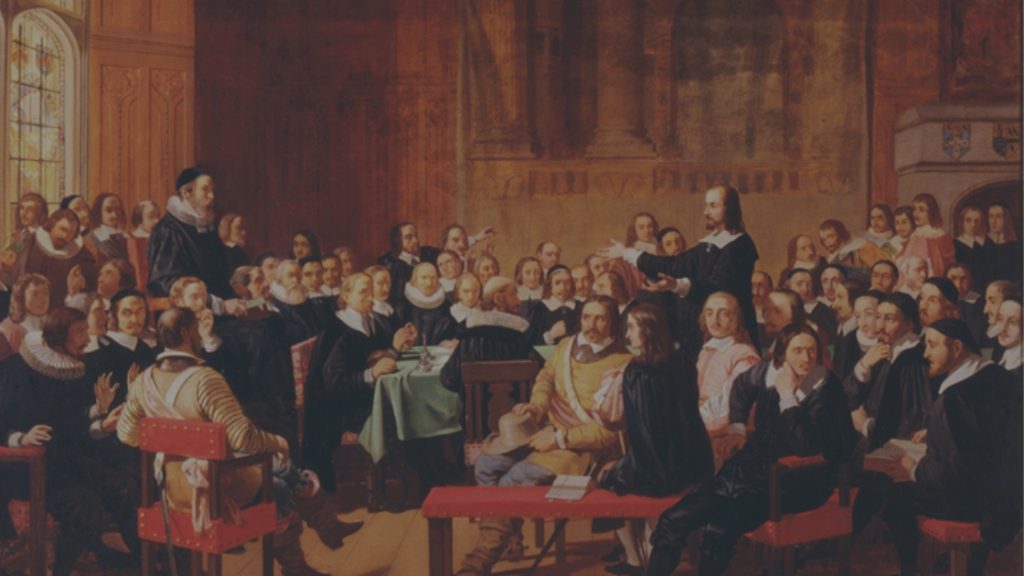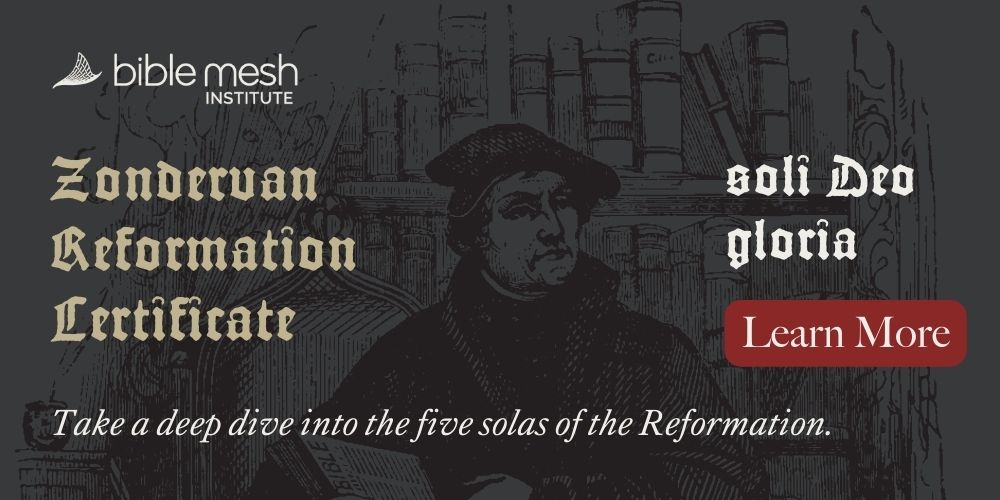The following article is an adaptation of a BibleMesh Institute webinar discussion with guest speaker Dr. Martyn Cowan, Vice Principal and Lecturer in Historical Theology at Union Theological College.
Christians around the world commemorate October 31st as Reformation Day, when we remember Martin Luther nailing his ninety-five theses to the Wittenburg church door and the rise of the Protestant Reformation sparked by him and others in the sixteenth century. This “reformation” of the Catholic church developed from the long-simmering sentiment that God’s Word should be the standard for Christian theology and church practice, and that much of the Catholic church did not measure up.
The Protestant movement would witness the birth of the many traditions that we see dotting our ecclesial landscape today. Lutherans, Anglicans, and Anabaptists owe their roots to the German break with Rome sparked by Martin Luther in 1517. The Reformed tradition also traces its lineage to this recovery of biblical orthodoxy.
The Reformed tradition is at once monumental in importance and influence, and yet notoriously difficult to define. Christians across a spectrum of many church traditions use the term “Reformed” to speak of particular confessions, like the Westminster Confession of Faith or the Three Forms of Unity (Belgic Confession, Heidelberg Catechism, and the Canons of Dordt).
The Reformed tradition is at once monumental in importance and influence, and yet notoriously difficult to define.
Others use the term to describe a certain doctrine of salvation with a high view of God’s sovereignty in choosing the elect and enabling them to believe and be saved—what is often used interchangeably with “Calvinism.” Still others, regardless of their theology, self-identify their churches as “Reformed,” but with little adherence to either the confessions or theological descriptors just mentioned.
Our Master of Arts in Theology degree, taught and administrated by BibleMesh in partnership with Union Theological College, Belfast, aims to equip students for ministry by resourcing the Reformed tradition. But what exactly is the Reformed tradition, and what might it offer Christians today?
The Reformed Tradition and the Reformation
It goes without saying that the Reformed tradition arose out of the 16th century Protestant Reformation. It got its name particularly because the churches which were shaped by that historic disruption in western Christendom described themselves as being churches that were “reformed” from the errors of Roman Catholicism according to the word of God.
Yet the Reformation was not a unified movement. Differences in geography and politics, along with varied theological priorities, led to different streams of Protestantism. There was Lutheranism in Germany and the Nordic states, Anglicanism in England, and radical Anabaptism throughout Europe, among others. Another stream, the Reformed, grew out of the Swiss Reformation and spread to Germany, France, the Low Countries, Scotland, and parts of Western Europe.
Yet the Reformation was not a unified movement. Differences in geography and politics, along with varied theological priorities, led to different streams of Protestantism.
Having fled France, pastor and theologian John Calvin settled in Geneva and from there and surrounding Swiss cantons the Reformed churches developed their own distinctive theology under Calvin’s and others’ influence. Figures such as Theodore Beza, Ulrich Zwingli, and Heinrich Bullinger helped deepen and clarify the movement’s convictions in reference to doctrines like God’s sovereignty, the church’s sacraments, and the role of the civil magistracy.
But it was not just the theology of specific pastors or theologians which came to define what it meant to be Reformed. Instead, it was the adoption of the Reformed confessions of faith, in which distinctives that set the Reformed apart from Lutherans and radicals were articulated for the churches. Such confessions served to summarize what the non-Lutheran and Anabaptist Reformed churches in Switzerland and beyond held in common theologically, and therefore came to be known as the Reformed confessions. They were certainly Protestant in their shared convictions with the Lutherans on the graciousness of the Gospel and the authority of Scripture, and yet in other areas like church order and the primacy of the divine decree, they were quite distinct.
With this in mind, how might we proceed in defining the Reformed tradition as we encounter it today? Let’s consider three approaches.
Defining the Reformed Tradition
One approach might be to only call those churches which trace their historical lineage back to the “Reformed” churches of Switzerland, the Low Countries, or Germany which self-describe themselves Reformed. This historical approach certainly has appeal based on the desire to be historically accurate. In each of these regions, a Reformed church was planted that churches today can show historical continuity with, such as the Christian Reformed Church in North America (CRCNA) tracing its history back to the Gereformeerde Kerken in Nederland (Dutch Reformed Churches) and the Nederlandse Hervormde Kerk (the national Dutch Reformed Church).
But despite the names of such churches including the marker “Reformed,” what is the basis of such historical continuity? It was the theology that the churches confessed in adherence to the historic Reformed confessions. This therefore gives us a second approach to defining what it means to be Reformed. Such confessional understanding of the Reformed tradition sees the “forms of unity” as the defining characteristic for us today. That is, churches recognizing the ecclesial authority of the confessions as establishing common church order and practice through setting the boundaries of a shared theology. The confessions offer articulation of what Reformed churches ought to believe in order to see themselves as aligned with the historic Reformed tradition.
But this gives rise to another question: which confessions? For the historic Reformed churches developed many different confessions, with some locally or regionally adopted like the Basel Confession, while others received more international usage. But even with more internationally recognized confessions like the Second Helvetic Confession, which although Swiss it was adopted by churches in Germany and Scotland, they have been supplanted in favor of other later confessions like the Belgic Confession or the Westminster Standards.
Similarly, there is disagreement among some over whether movements like the Reformed Baptists, who produced their own adaptations of Reformed confessions in line with their theological distinctives, can be rightly called Reformed. With the Reformed Baptists in particular, who generally adhere to the 1689 Second London Confession, which is an adaptation of the Westminster Confession to Baptist ecclesiology, this is especially pertinent.
Such questions therefore give rise to a third approach to defining the Reformed tradition. A theological approach sees continuity on the basis of theological markers which serve to unify the churches, confessions, and even individual Christians around a set of essential beliefs. In common usage, these are recognized as adherence to “Calvinistic” doctrines of grace or a high view of God’s sovereignty in election.
But as Michael Allen convincingly argues, this theological approach serves to flatten the doctrinal distinctives of the Reformed to a particular soteriology, when in reality it was the ecclesiology of the Reformed which both really set them apart and served to internally unify their thought into a coherent system reflected in the confessions.
In reality it was the ecclesiology of the Reformed which both really set them apart and served to internally unify their thought into a coherent system reflected in the confessions.
So, what can we say positively about what Reformed theology actually holds? Granting the complexity of the question for the reasons mentioned above, at the very least we can say that the Reformed tradition offers a theology that is decidedly Protestant, sharing with other Reformation movements the conviction that Scripture is the norming norm for all knowledge of God and right worship as his church, and that the church is saved through a Gospel of grace that is received solely by faith.
All of this work of God is ordered by the supremacy of God’s decree, as Herman Bavinck says, and therefore a hallmark of the Reformed tradition is a concern to trace out the implications of God’s gracious and sovereign decree to all areas of biblical interpretation, theological formulation, and ecclesial praxis. Such ordered principle of God’s supreme decree is related to a covenantal reading of Scripture whereby God sets the terms for his people’s relation to him, and these terms order their life and praxis, especially in the way the church worships and celebrates Christ’s spiritual presence in the sacraments.
Much more can be said on tracing the distinctives of the Reformed tradition, but at the very least we conclude with this. Granting the limitations of the historical, confessional, and theological approaches, to be Reformed today cannot mean doing theology and worshipping as a church without relation to the historic Reformed confessions and the theology which set the Reformed churches apart in the dizzying landscape of the Protestant Reformation.
What Might the Reformed Tradition Offer Christians Today?
So, what stands to be gained from studying the Reformed tradition today? The Reformed tradition offers a coherent, mature theological system which addresses not only every area of Christian belief, but also aims to address every part of life. Reformed theology has God’s providential control of history by his sovereign decree as its central hub, and he not only sets the terms for how his creatures are to know and be saved by him, but also how those creatures ought to walk in his ways, especially as his church. It is here especially, in what it means to be the church and how the church relates to the world, that the Reformed tradition’s wisdom is especially pertinent. Evangelicals across the spectrum are fiercely debating issues that all stem from ecclesiology.
The Reformed tradition offers a coherent, mature theological system which addresses not only every area of Christian belief, but also aims to address every part of life.
As Martyn Cowan says, “Those things that evangelicals disagree on are things we need to talk about and discuss because they help us with the challenges of today. Those are things to do with the church and its nature, the church’s relationship to the world, what the worship of the church is like, how the church ought to be governed, how churches ought to relate to each other. It is in those areas that the Reformed tradition has the most to offer us today.”
As we seek to recover the wisdom of the Reformed tradition, then, let us do so with a clearer understanding of what it means to be Reformed and how that relates to the historic and confessional roots of this particular stream of Reformation theology.
We run monthly webinars as a way to gather interest in our fully online Master of Arts in Theology programme. This article was adapted from a previous webinar with Dr. Martyn Cowan on the topic “What is Reformed Theology?”.

